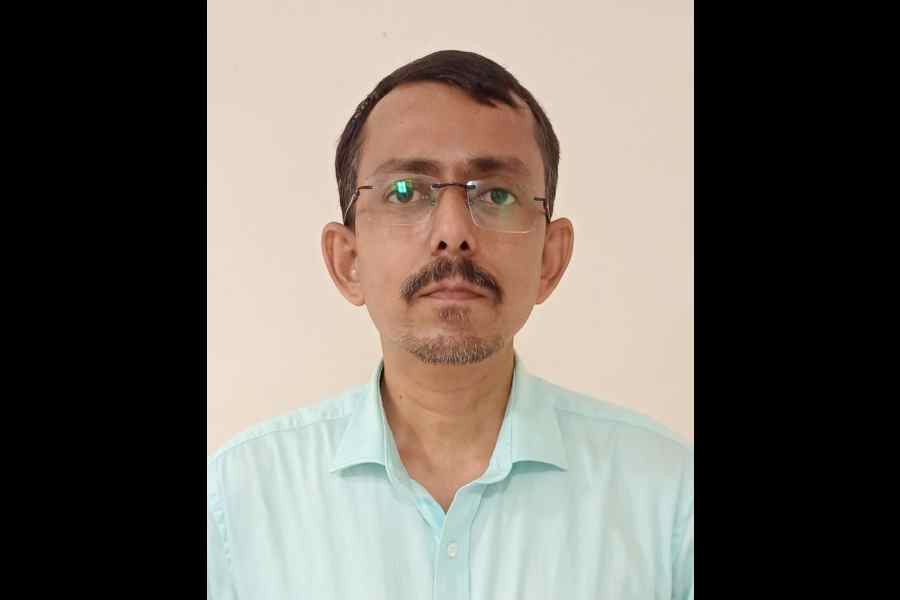Burdwan University on Tuesday postponed the counselling process to enrol PhD scholars in history amid speculation that it was having second thoughts on allowing convicted Maoist leader Arnab Dam, who topped the interview, to physically attend the six-month mandatory coursework.
Dam, also known as Comrade Bikram aka Surya, was sentenced to life imprisonment earlier this year after being found guilty in the Maoist attack on a camp of the security forces at Silda in erstwhile West Midnapore in 2010.
The 44-year-old son of a judicial magistrate had dropped out of IIT Kharagpur’s mechanical engineering department before joining the CPI (Maoist) in 1998.
Dam completed his BA and MA from Indira Gandhi National Open University (Ignou) from behind bars in 2012. To fulfil his academic target of a PhD in history, Dam cleared the State Eligibility Test (SET) in 2019, which made him eligible for research.
Dam inched closer to his objective when he appeared before the doctoral committee of Burdwan University for an interview on June 26 on short-term parole. He came first among 220 students by scoring 76.86 per cent. A university teacher said 70 per cent of his marks were from academic scores and 30 per cent from the interview.
Last week, the university authorities asked the Hooghly Correctional Home, where Dam is lodged, to send him for counselling for enrollment as a PhD scholar in history on June 9.
However, that did not happen as the varsity authorities postponed the process for the history department without citing any reason.
“Suddenly, in a fresh communication on Monday, Burdwan University informed the superintendent of Hooghly Correctional Home that the counselling process had been postponed, without giving any reasons,” said an official in the correctional home department.
On the reason behind calling off the counselling, Burdwan University vice-chancellor Goutam Chandra said the varsity had decided to clear a specific issue from the correctional home authorities.
“According to the rule (UGC norms), a research scholar has to complete his six-month coursework physically. As he (Dam) is in jail, we have written to the correctional home authorities asking whether they can allow him to attend physical classes for the next few months with proper security. Once we get clearance, we will conduct the PhD counselling in history,” said Chandra. He said a new date for counselling was yet to be fixed.
During the interview, Dam had proposed to work on the history of development in remote parts of coastal areas and the Sunderbans.
“We found him very composed, confident and sharp during the interview,” said Syed Tanveer Nasreen, the head of the history department at Burdwan University.
The university’s stand has sparked a controversy on the campus with a section of teachers wondering why the issues were not sorted out before calling Dam for the interview. They also pointed out that the decision had created problems for several students who had applied for PhD.
“The university should have cleared all these issues before interviewing the former Maoist leader. It is very unusual to postpone the counselling once the interview has been done,” said Bhaskar Goswami, the secretary of the Burdwan University Teachers’ Association.
A senior professor at Visva-Bharati in Santiniketan claimed that Dam’s coursework should not have been an issue.
“His subject is not related to laboratory work. Therefore, attending physical coursework should not be an issue at all. Usually, such classes take place once or two days a week. The guide and the scholars can amicably settle the dates of their classes,” the professor added.
He also did not rule out the possibility of Dam being denied an opportunity to pursue research in the long run.
“We have another point to flag. The university should ensure that he (Dam) is treated as a common scholar, not as a former Maoist leader, as it would create trouble for his co-researchers and also embarrass him,” said Goswami.
Dam was accused in at least 30 criminal cases of Maoist attacks and killings mainly in Jungle Mahal that witnessed Left-wing extremism from 2006 till 2011.
Even though he was acquitted or granted bail in other cases, Dam was found guilty in the Silda attack under the Unlawful Activities Prevention Act (UAPA).
Extremism in the region began to take a backseat with the encounter killing of Mallojula Koteswara Rao aka Kishenji on the Bengal-Jharkhand border in November 2011, a few months after Mamata Banerjee took over as chief minister.
While Rao marshalled Maoist activities in the region, Dam, the then state committee member of the CPI (Maoist), played an active role in Bengal, Bihar, Jharkhand and Odisha. Rao’s death pitchforked him into a critical role in Maoist operations in the region.
Dam was arrested in 2012 by the state police near the Ayodhya Hill in Purulia where he had come to meet someone. The police had recovered an AK-47 gun and ammunition from his possession.
A police officer who was part of the anti-Maoist operation in Jungle Mahal recalled that Dam’s arrest had become mandatory to curb extremism in Jungle Mahal as he was the founder of the outfit’s Purulia platoon.
“He was in charge of the state committee to roll out policies and fix targets for attacks. He was the most intelligent Maoist cadre in the region and took on the leadership after Kishenji’s death,” said a police officer.










